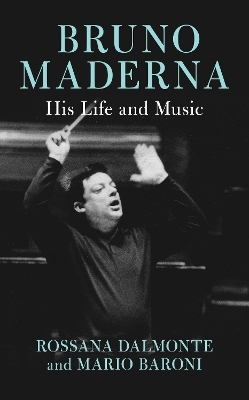
Bruno Maderna
His Life and Music
Seiten
2024
Rowman & Littlefield (Verlag)
978-1-5381-9640-3 (ISBN)
Rowman & Littlefield (Verlag)
978-1-5381-9640-3 (ISBN)
Bruno Maderna, one of the most influential composers in the 20th century and a formidable conductor, was the oldest of a notable group of Italian composers who began their careers shortly before the Second World War. Many details of this biography are based on his correspondences and reports of his engagements across the world.
Bruno Maderna was one of the most influential composers in the twentieth century. He was the eldest of the group of Italian composers born in the 1920s (along with Berio, Nono, Donatoni, and others) who began their career shortly before the second World War and were able to exploit the opportunities offered by the new world that emerged in the post-war years.
Maderna’s story is quite unique. He rose to fame early in life as a child prodigy and his exceptional talent was soon noticed by Gian Francesco Malipiero, who stimulated his interest in ancient music, a passion that remained constant even when the European avant-garde insisted that new music should start from year zero. After first approaching “classic” dodecaphony, his musical style then tended toward total serialism and “open form.” In his last years he developed a particular interest for the theater. Satyricon was born in Tanglewood in a short version and later achieved notable success worldwide. His work as a conductor made him particularly sensitive to the reaction of the public, leading him to carefully calibrate his approach to composition without being swayed by fashionable ideals or philosophies. Despite his warm and outgoing nature, Maderna rarely expressed his personal views in writing or in interviews.
Many of the biographical details given here are taken from his correspondence and from reports of his travels and engagements across the world, which took him as far as the United States, Iran South America, and Japan.
Bruno Maderna was one of the most influential composers in the twentieth century. He was the eldest of the group of Italian composers born in the 1920s (along with Berio, Nono, Donatoni, and others) who began their career shortly before the second World War and were able to exploit the opportunities offered by the new world that emerged in the post-war years.
Maderna’s story is quite unique. He rose to fame early in life as a child prodigy and his exceptional talent was soon noticed by Gian Francesco Malipiero, who stimulated his interest in ancient music, a passion that remained constant even when the European avant-garde insisted that new music should start from year zero. After first approaching “classic” dodecaphony, his musical style then tended toward total serialism and “open form.” In his last years he developed a particular interest for the theater. Satyricon was born in Tanglewood in a short version and later achieved notable success worldwide. His work as a conductor made him particularly sensitive to the reaction of the public, leading him to carefully calibrate his approach to composition without being swayed by fashionable ideals or philosophies. Despite his warm and outgoing nature, Maderna rarely expressed his personal views in writing or in interviews.
Many of the biographical details given here are taken from his correspondence and from reports of his travels and engagements across the world, which took him as far as the United States, Iran South America, and Japan.
Rossana Dalmonte began her academic career at Bologna University asassistant professor of history of music. From 1987 to 2008, she was full professor of musicology at Trento University, where she also directed an international PhD in “music sciences.” She founded the Istituto Liszt in Bologna and became director of the Institute’s periodicals Quaderni dell’Istituto Liszt and Rarità Lisztiane. Mario Baroni was formerly director of the department of music at Bologna University. He founded the Italian association for the analysis and theory of music (GATM), and for three years was president of the European Society for the Study of Cognitive Aspects of Music (ESCOM).
| Erscheinungsdatum | 23.01.2024 |
|---|---|
| Verlagsort | Lanham, MD |
| Sprache | englisch |
| Maße | 151 x 228 mm |
| Gewicht | 454 g |
| Themenwelt | Kunst / Musik / Theater ► Musik ► Klassik / Oper / Musical |
| ISBN-10 | 1-5381-9640-9 / 1538196409 |
| ISBN-13 | 978-1-5381-9640-3 / 9781538196403 |
| Zustand | Neuware |
| Haben Sie eine Frage zum Produkt? |
Mehr entdecken
aus dem Bereich
aus dem Bereich
wie wir unsere Musikkultur retten
Buch | Hardcover (2023)
Frankfurter Allgemeine Buch (Verlag)
CHF 38,90


